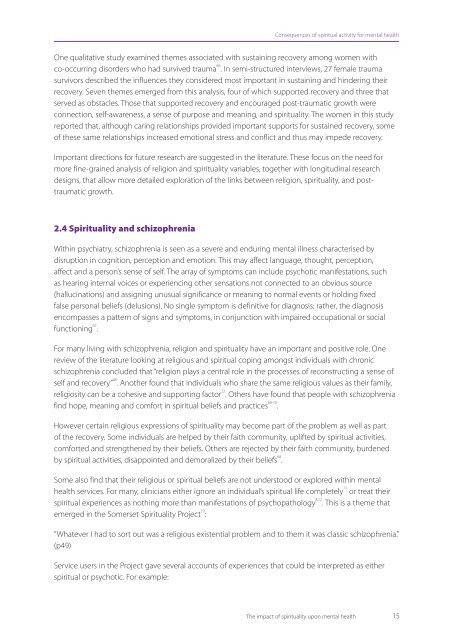The Gift of Spirituality
The Gift of Spirituality
The Gift of Spirituality
Create successful ePaper yourself
Turn your PDF publications into a flip-book with our unique Google optimized e-Paper software.
Consequences <strong>of</strong> spiritual activity for mental health<br />
One <strong>of</strong> the more common areas <strong>of</strong> research in the literature explores the association between anxiety<br />
and spirituality amongst individuals who have chronic or life-threatening illnesses. For example, in one<br />
study, heart transplant patients that attended church frequently reported less anxiety and had higher<br />
self-esteem than those who attended less frequently 22 . Similarly, one study explored whether spiritual<br />
involvement and beliefs and spiritual coping mechanisms could account for any <strong>of</strong> the variation in<br />
anxiety among women within one year’s diagnosis <strong>of</strong> cervical cancer. <strong>The</strong>y found that anxiety was more<br />
common in those who did not use positive spiritual coping mechanisms, and that this was especially<br />
true for younger women and those with more advanced stages <strong>of</strong> the disease 52 . Reduced levels <strong>of</strong><br />
anxiety associated with spiritual activity have also been found in other populations, including medical<br />
patients in later life 53 , women with breast cancer 54 , middle aged people with cardiac problems 55 and<br />
those recovering from spinal surgery 56 .<br />
One <strong>of</strong> the spiritual activities that was commonly measured in these populations was prayer and/or<br />
meditation. <strong>The</strong>se are activities that users <strong>of</strong> mental health services have also associated with improved<br />
mental health. For example, in the Somerset <strong>Spirituality</strong> Project 19 , one interviewee said that prayer was<br />
her coping mechanism:<br />
“God became a friend… everything, I discussed with God… [He] put up with loads… it’s how I<br />
survived.” (p32)<br />
Yoga and meditation are also associated with improvements in mental health and reductions in<br />
anxiety in the qualitative literature. Despite this, there has been little quantitative research examining<br />
the association between yoga/meditation and anxiety. A recent systematic review found eight<br />
studies that specifically explored the impact <strong>of</strong> yoga on anxiety and concluded that although the<br />
results were encouraging, the extent <strong>of</strong> the methodological inadequacies meant that further research<br />
was necessary 57 . A similar conclusion was reached in a study published after the systematic review,<br />
which aimed to evaluate potential effects <strong>of</strong> Iyengar Hatha yoga on perceived stress and associated<br />
psychological outcomes in women with anxiety disorders. Women attended twice-weekly yoga classes,<br />
each lasting 90 minutes. Compared to those allocated to the waiting list control group, women who<br />
participated in the yoga-training demonstrated pronounced and significant improvements in perceived<br />
stress, state and trait anxiety, well-being, vigour, fatigue and depression. Physical well-being also<br />
increased and those subjects suffering from headache or back pain reported marked pain relief. Salivary<br />
cortisol (a measure <strong>of</strong> stress) decreased significantly after participation in a yoga class 58 .<br />
Not all research exploring the association <strong>of</strong> spiritual or religious activity and anxiety shows a beneficial<br />
effect <strong>of</strong> the former on the latter. Rather, it seems to depend to some extent on the way in which<br />
spirituality is expressed. For example, increased anxiety is <strong>of</strong>ten found amongst those with a strict<br />
religious upbringing 59 and emotional distress is also greater in those who fall into Genia’s 60 spiritual<br />
typologies <strong>of</strong> dogmatic or underdeveloped spirituality. In contrast, those who are categorised as<br />
spiritually growth-oriented or transitional tend to have lower rates <strong>of</strong> anxiety 61 .<br />
Overall, the picture is not yet complete. Many investigations <strong>of</strong> this relationship have used<br />
measures <strong>of</strong> spirituality that do not reflect its complexity nor control for other potential mediating<br />
variables. Although the general sense is one <strong>of</strong> optimism for the role spirituality can play in helping<br />
to reduce symptoms and feelings <strong>of</strong> anxiety, further research is required to establish the true nature<br />
<strong>of</strong> that relationship.<br />
<strong>The</strong> impact <strong>of</strong> spirituality upon mental health<br />
13

















